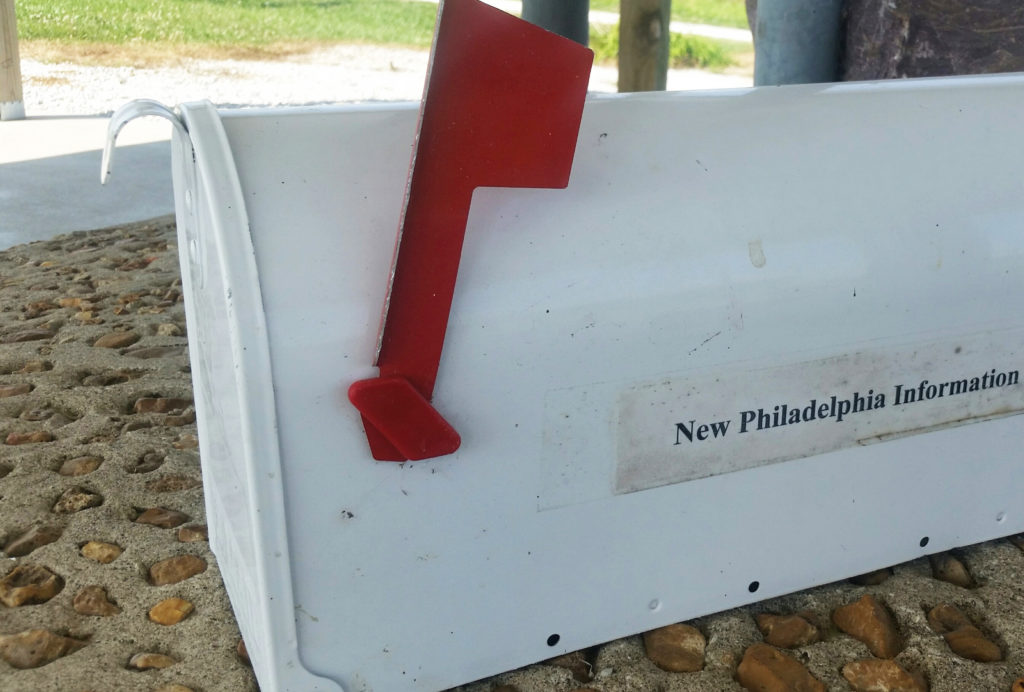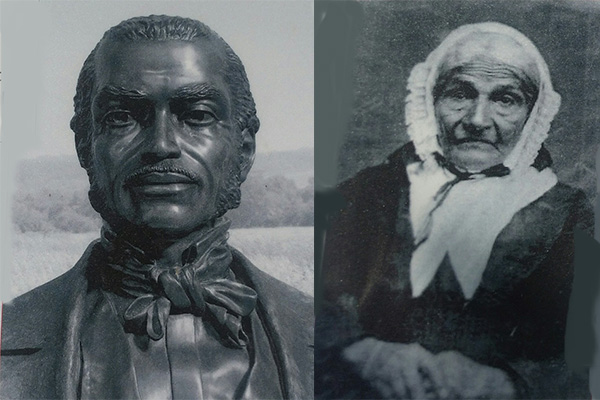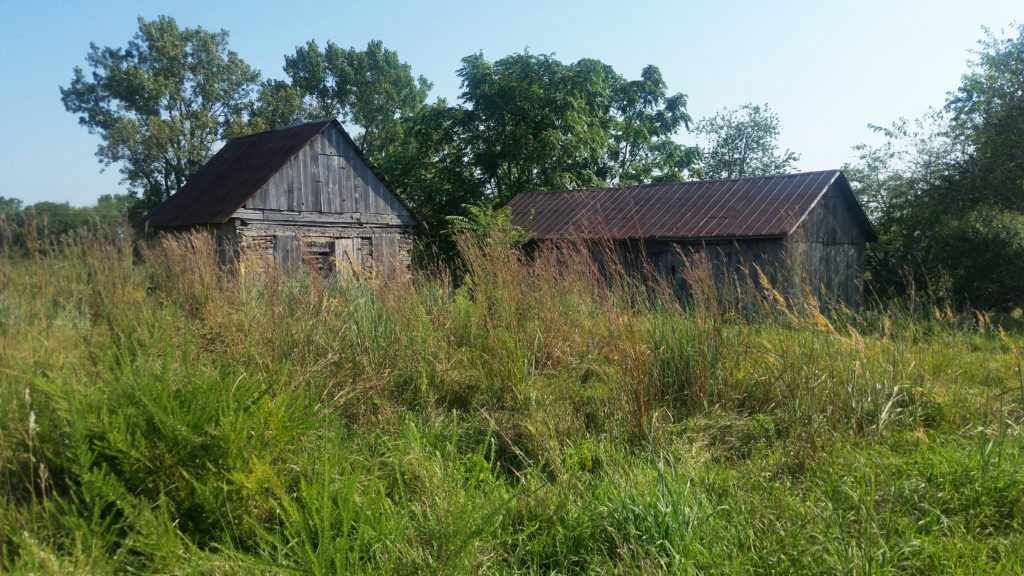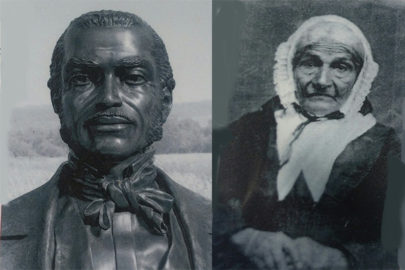By Don Radebaugh – I admit it…I’m a sucker for those brown historical marker signs. I’ll drive way, way out of my way just to find out what’s on the other end. That’s also why I usually travel alone. Folks tend to get annoyed when I continually stray off course.
Some of those signs are duds, but many, if not most, steer me toward new treasures that ignite my imagination, remind me why I love history and leave me starving for more. And that’s what happened on my way to Hannibal, Missouri last summer. I was soooo excited to get to Hannibal…to visit the Mark Twain sites, including his boyhood home. I couldn’t wait to get there. I was heading west through Illinois, coming up on the Missouri border when, out of nowhere, one of those dad-gum dinky brown signs jumped right out at me. “New Philadelphia next exit”. New Philadelphia? Never heard of it. I couldn’t even find it on the map. Yes, I still use maps.
It didn’t much matter though because I had talked myself out of going anyway…kept reminding myself how bad I wanted to get to Hannibal, which was true. Then, at the very last possible moment, you guessed it…hard right onto the exit and down the two-lane road toward New Philadelphia. Fortunately, it wasn’t too many miles away. If not for the marker sign at the actual site, I would have driven right by. New Philadelphia, as it turns out, is only a plat of Illinois prairie grass with a couple of old wooden, rundown shacks. Well, this shouldn’t take long, and I’ll soon be back on course.
The first thing that got my attention was a mailbox. I thought…who on earth would be sending mail to New Philadelphia? There’s nothing here…no one to receive it. Anyway…surely, something happened here, and I wasn’t leaving before I figured it out.
At any rate, welcome to New Philadelphia, Illinois. Population…one. And since I was already knee deep in my newest History Mystery adventure, I owed it to myself to at least read the sign boards, and that’s when the story got really good. New Philadelphia was about to come to life.
In fact I had just stumbled upon the site of the first town in America established by a free African-American. His name was Frank McWorter, and he founded New Philadelphia in 1836. How on earth did he do that?

Born into slavery in South Carolina in 1777 during the American Revolution, he moved with his plantation owner, George McWorter, to Pulaski County, Kentucky in 1795. Frank, being the industrious type, convinced George to let him to stay on and run the farm while George moved onto Tennessee. Then Frank married an enslaved African-American by the name of Lucy in 1799. During the War of 1812, he started a saltpeter works in his spare time and worked as a hired hand on the nearby farms. With his earnings, Frank purchased freedom for Lucy in 1817, and for himself in 1819, a total cost of $1600, a fortune back then. How admirable is that? He bought his wife’s freedom before his own. I want to know more about this man.
Right after gaining his own freedom, he began investing in land in Pike County, Illinois in between the Mississippi and Illinois Rivers and moved to a farm north of the property in 1830. He then subdivided and sold tracts from the land he owned, and then platted and legally registered the town of New Philadelphia in 1836. It was also at this time that he legally took on the name McWorter. There’s something meaningfully symbolic in play here. Frank McWorter, a free black man, had essentially earned a “new birth of freedom”, hence the name New Philadelphia. If America was born in Philadelphia, Frank was reborn as a free man in New Philadelphia. His choice to name the town New Philadephia was no accident.
Frank and Lucy had seven children, four in slavery and three in freedom. Three of those children remained in bondage in Kentucky when Frank and Lucy migrated to Illinois. Can you even imagine how painful that must have been for Frank and Lucy? But Frank had a plan, and he aimed to see it through.
More than anything, Frank McWorter, a man of great purpose, yearned to see his entire family free, and likely, the influence behind his enterprising nature. Fortunately, Frank was successful enough to one day purchase freedom for all his children. However, several grandchildren remained in bondage and work continued to free them after Frank’s death in 1854. Lucy lived to be nearly 100 before she died on their farm north of town in 1870.
And it was about that time that New Philadelphia began to fade away. Frank originally chose the location because it tracked alongside the canal system that they understood to be coming. However, when the railroad came through just shy of 1870, it bypassed New Philadelphia altogether. Without a steady flow of commerce close by, New Philadelphia began to decline, ultimately disappearing from the landscape, but not before it served Frank and Lucy McWorter long enough to secure freedom for their dear children. I can think of nothing more honorable, than to devote your life to secure freedom for your family. Frank McWorter was clearly a man a among men…magnanimous, admirable…the definition of integrity.
I spent about two hours in solitude at New Philadelphia, scouring the grounds, thinking, contemplating what happened there…imagining the town hustling along in its heyday, full of faith for better days ahead. The day was brutally hot and humid without a sniff of wind. Satisfied that I had learned enough for now, and ready for a little modern-day AC, I turned toward my car and reached for the door handle. At that very moment, a sudden, and very warm, brisk summer breeze came hard across the overgrown prairie grass…one big whoosh. I turned around. It didn’t last long…just a brief blast. Just long enough to lay the tall grass down and stand it right back up again…as if to salute me, maybe a nod from the founders? If the dead can see, then I believe Frank McWorter saw me. Now, complete silence, stillness. I finished up the motion with the door handle, got in, and drove away.
@DonRadebaugh
NOTES: In 2014, U.S. Senators Richard Durbin and Mark Kirk advanced a bill in the Senate, and Congressman Aaron Schrock advanced a matching bill in the House of Representatives to have the National Park Service (NPS) assess the New Philadelphia National Historic Landmark site for inclusion in the NPS system. President Barack Obama (and former U.S. Senator from Illinois) signed this legislation into law on December 19, 2014.


Thank you President Barack Obama for signing into law legislation to make New Philadelphia an historical landmark, from a McWhorter descendant who was so excited to find my ancestors were memorialized on a Revolutionary War Plaque in Monroe, S C., until I discovered this outstanding man who became my true hero. It is so saddens me how I’m connected, but so proud to claim this man as a part of my heritage and family.